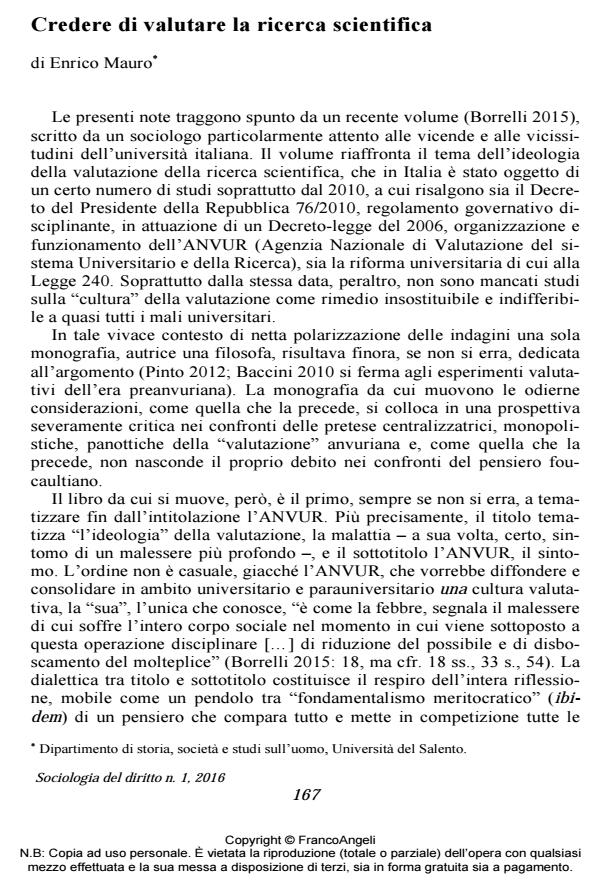Believing in the evaluation of academic research
Journal title SOCIOLOGIA DEL DIRITTO
Author/s Enrico Mauro
Publishing Year 2016 Issue 2016/1
Language Italian Pages 8 P. 167-174 File size 145 KB
DOI 10.3280/SD2016-001008
DOI is like a bar code for intellectual property: to have more infomation
click here
Below, you can see the article first page
If you want to buy this article in PDF format, you can do it, following the instructions to buy download credits

FrancoAngeli is member of Publishers International Linking Association, Inc (PILA), a not-for-profit association which run the CrossRef service enabling links to and from online scholarly content.
The book behind this discussion stresses how the issue of the ideology of evaluation, a corollary of the ideology of meritocracy, is related to scientific research, framing it in an economic-political and politico-economic context that leaves no space for alternatives, without which politics simply does not exist. The system of evaluation of universities and research promoted by the competent Italian national agency ANVUR seriously distorts academic work in all sectors and at all levels, absorbing considerable resources, of which research is thus deprived. This system of evaluation, which is serial but not always serious, needs to be countered by an alternative approach to evaluation that is not centralised, monopolised, all-seeing or standardising, but informal, diffuse, horizontal, reciprocal and concerned not so much with guaranteeing ‘rigorous’, ‘regular’, ‘normal’ research, as with stimulating original, ‘exceptional’ and ‘revolutionary’ research. If evaluating is tantamount to breathing for a researcher, ANVUR cannot breathe for everyone.
Keywords: Scientific research - Evaluation - Meritocracy - Automatic pilot - Freedom of science
- Anderson, Melissa S., Emily A. Ronning, Raymond De Vries & Brian C. Martinson, 2007. The Perverse Effects of Competition on Scientists’ Work and Relationships. Science and Engineering Ethics, 13, 4: 437-461.
- Baccini, Alberto, 2010. Valutare la ricerca scientifica. Uso e abuso degli indicatori bibliometrici. Bologna: il Mulino.
- Borrelli, Davide, 2015. Contro l’ideologia della valutazione. L’ANVUR e l’arte della rottamazione dell’università. Milano: Jouvence.
- Büttgen, Philippe, & Barbara Cassin, 2009. “J’en ai 22 sur 30 au vert”. Six thèses sur l’évaluation. Cités, 10, 1: 27-41.
- Castellani, Tommaso, Emanuele Pontecorvo & Adriana Valente, 2014. Epistemological Consequences of Bibliometrics: Insights from the Scientific Community. Social Epistemology Review and Reply Collective, 3, 11: 1-20.
- Gillies, Derek, 2008. How Should Research Be Organized. London: College Publications.
- Jankélévitch, Wladimir, [1957, 1980]2011. Le Je-ne-sais-quoi et le Presque-rien. Ed. it. Il non-so-che e il quasi-niente, tr. di C. A. Bonadies. Torino: Einaudi.
- Mauro, Enrico, in corso di pubblicazione. In merito all’“arte” di “valutare” il “merito” senza entrare nel merito. In Rileggendo Pasolini: il diritto dopo la “scomparsa delle lucciole”. Roma: Aracne.
- Miller, Jacques-Alain, 2004. Senza titolo. In Id. & Jean-Claude Milner, Voulez-vous être évalué? Paris: Grasset.
- Neave, Guy, 1998. The Evaluative State Reconsidered. European Journal of Education, 33, 3: 265-284.
- —, 2012. The Evaluative State, Institutional Autonomy and Re-engineering Higher Education in Western Europe. The Prince and His Pleasure. New York: Palgrave Macmillan.
- Parker, Martin, & David Jary, 1995. The McUniversity: Organization, Management and Academic Subjectivity. Organization, 2, 2: 319-338.
- Pinto, Valeria, 2012. Valutare e punire. Una critica della cultura della valutazione, Napoli: Cronopio.
- Power, Michael, [1997, 1999] 2002. The Audit Society. Rituals of Verification. Tr. it. La società dei controlli. Rituali di verifica. Torino: Edizioni di Comunità.
- Sayer, Derek, 2015. Rank Hypocrisies. The Insult of the REF. Los Angeles-London-New Delhi-Singapore-Washington DC: SAGE.
- Veca, Salvatore, 2014. “Non c’è alternativa”. (Falso!). Roma-Bari: Laterza.
- Von Humboldt, Wilhelm, [1795]1970. Plan einer vergleichenden Anthropologie. Tr. it. Piano di un’antropologia comparata. In Id., Università e umanità, a cura di Fulvio Tessitore. Napoli: Guida.
- Waters, Lindsay, 2004. Enemies of Promise. Publishing, Perishing, and the Eclipse of Scholarship. Chicago: Prickly Paradigm Press.
Enrico Mauro, Credere di valutare la ricerca scientifica in "SOCIOLOGIA DEL DIRITTO " 1/2016, pp 167-174, DOI: 10.3280/SD2016-001008